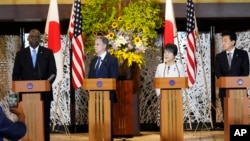After the recent 2+2 meeting in Tokyo bringing together the top diplomats and defense officials of the United States and Japan, Secretary of State Antony Blinken said the meeting delivered on commitments to modernize the U.S.-Japan alliance:
“First, we agreed to upgrade our respective command and control structures, including a new Joint Forces Headquarters to meet the challenges of this moment. Second, we held our first standalone ministerial on extended deterrence – demonstrating clearly, in other words, that our ironclad commitment to defend our allies with the full range of our conventional and nuclear deterrence capabilities is fully enforced. Third, through a new forum on defense industrial cooperation, we launched coproduction of advanced missiles. We’re leveraging Japan’s manufacturing capability to collectively produce critical national security technology.”
Secretary of Defense Lloyd Austin called the 2+2 meeting “truly consequential.”
“Strengthening our partnership and adding new momentum to our shared vision for a free and open Indo-Pacific. We are reinforcing our combined ability to deter and respond to coercive behavior in the Indo-Pacific and beyond,” he said.
In a joint statement following the meeting, among current challenges, the two countries “concurred that the People’s Republic of China (PRC)’s foreign policy seeks to reshape the international order for its own benefit at the expense of others.” They deplored the PRC’s actions undermining Japan’s peaceful administration of the Senkaku Islands; its repeated obstruction of Philippine vessels’ exercise of high seas freedom of navigation; the PRC’s ongoing and rapid expansion of its nuclear weapons arsenal.
Japan and the United States underscored their basic position on Tawain remains unchanged, and they reiterated the importance of maintaining peace and stability across the Taiwan Strait. The two countries also expressed “numerous serious concerns about the dismantling of Hong Kong’s autonomy and freedoms,” as well as the PRC’s human rights violations in Xinjiang and Tibet.
Secretary of State Blinken emphasized the modifications and modernizations that the United States and Japan have agreed to “are defensive in nature. They have no ambitions toward anyone else and are, never have been, never will be offensive in nature.” But at a time,” he said, “when unfortunately these threats are increasing, alliances … are getting deeper, they’re getting stronger, they’re getting more effective.”
Secretary Blinken declared, “[I]t’s manifestly in the interests of our people – the Japanese people, the American people, [and] people well beyond our countries.”






